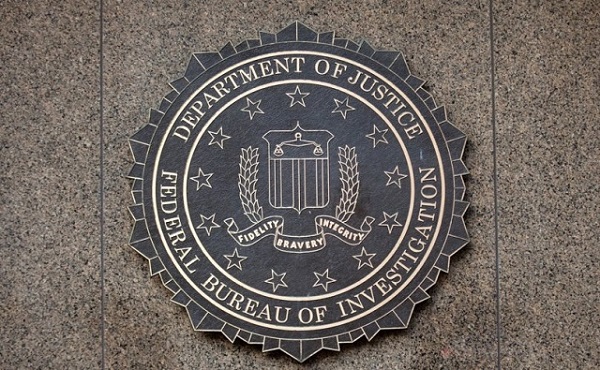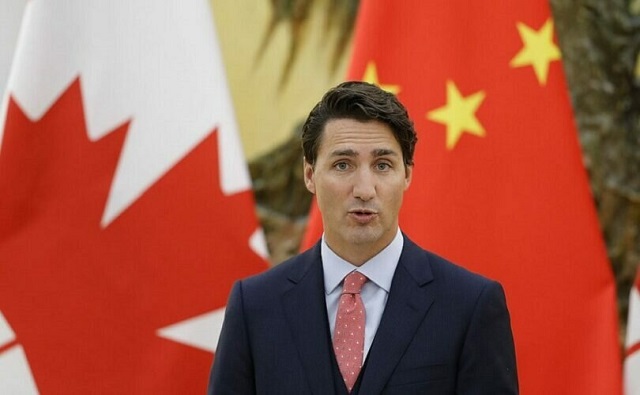Crime
Red Deer RCMP arrest two with drugs and guns in traffic stop

Red Deer, Alberta – Red Deer RCMP arrested a man and a woman after a late night traffic stop on October 10 led to the seizure of two firearms, methamphetamine and drug trafficking paraphernalia; the pair faces 62 charges.
At 11:30 pm on October 10, a member of the Red Deer RCMP traffic unit was on patrol in the Highland Green neighbourhood and located a suspicious vehicle in an alley. As police approached, the vehicle came to a stop in a parking lot and the male driver and female passenger attempted to walk away from the scene. They were detained by police without incident. In a subsequent search of the vehicle, RCMP seized a loaded handgun and a loaded rifle which had been stolen during residential break-ins in Blackfalds and Sylvan Lake, other weapons including knives, a hatchet and multiple cans of bear spray, what is believed to be methamphetamine, cash seized as proceeds of crime, items consistent with drug trafficking, and large amounts of stolen identification.
RCMP have sworn a number of criminal charges against the pair and continue to investigate the circumstances around the various pieces of stolen identification.
“The Red Deer RCMP Pinpoint crime reduction strategy involves every Red Deer unit actively applying targeted attention to crime hot spots, to prolific offenders and to public safety,” says Inspector Gerald Grobmeier of the Red Deer RCMP. “This duo faces 62 charges in total as a result of traffic enforcement efforts to help keep Red Deer as safe as possible on all levels of policing.”
31 year old Michael Onischuk was on numerous weapons prohibitions at the time of his arrest; he faces the following 50 charges:
- CDSA 5(2) – Possession for the purpose of trafficking
- Criminal Code 355(a) – Possession of proceeds of crime over $5,000
- Criminal Code 92(2) – Possession of restricted firearm without licence
- Criminal Code 92(1) – Possession of firearm without licence
- Criminal Code 86(1) – Careless use/ storage/ transportation of firearm X 2
- Criminal Code 91(2) – Possession of prohibited weapon X 3
- Criminal Code 95 – Possession of loaded firearm
- Criminal Code 94(1) – Possess of restricted firearm in a vehicle
- Criminal Code 96(1) – Possession of firearm obtained by crime X 2
- Criminal Code 117.01(1) – Firearm or weapon possession contrary to prohibition order X 36
- TSA 94(2) – Drive while unauthorized
Onischuk was remanded to appear in court in Red Deer on October 12 at 9:30 am.
29 year old Chelsey Praski-O’Connor faces the following 12 charges:
- CDSA 5(2) – Possession for the purpose of trafficking
- Criminal Code 355(a) – Possession of proceeds of crime over $5,000
- Criminal Code 92(2) – Possession of restricted firearm without licence
- Criminal Code 92(1) – Possession of firearm without licence
- Criminal Code 86(1) – Careless use/ storage/ transportation of firearm X 2
- Criminal Code 91(2) – Possession of prohibited weapon X 2
- Criminal Code 95 – Possession of loaded firearm
- Criminal Code 94(1) – Possess of restricted firearm in a vehicle
- Criminal Code 96(1) – Possession of firearm obtained by crime X 2
Praski-O’Connor was remanded to appear in court in Red Deer on October 12 at 9:30 am.
Addictions
Liberal MP blasts Trudeau-backed ‘safe supply’ drug programs, linking them to ‘chaos’ in cities

First responders in Ottawa dealing with a crisis Fridayman 0102 / YouTube
From LifeSiteNews
‘There is certainly the perception by a lot of Canadians that a lot of downtown cores are basically out of control,’ Liberal MP Dr. Marcus Powlowski said, before pointing specifically to ‘safe supply’ drugs and injection sites.
A Liberal MP has seemingly taken issue with “safe supply” drug policies for increasing public disorder in Canada, policies his own party, under the leadership of Prime Minister Justin Trudeau, has endorsed.
During an April 15 health committee meeting in the House of Commons, Liberal MP Dr. Marcus Powlowski, while pressing the Royal Canadian Mounted Police (RCMP), stated that “safe supply” drug policies have caused Canadians to feel unsafe in downtown Ottawa and in other major cities across the country.
“There is certainly the perception by a lot of Canadians that a lot of downtown cores are basically out of control,” Powlowski said.
“Certainly there is also the perception that around places like safe supply, safe injection sites, that things are worse, that there are people openly stoned in the street,” he continued.
“People are getting cardio-pulmonary resuscitation performed on them in the street. There are needles around on the street. There is excrement on the street,” Powlowski added.
“Safe supply“ is the term used to refer to government-prescribed drugs that are given to addicts under the assumption that a more controlled batch of narcotics reduces the risk of overdose – critics of the policy argue that giving addicts drugs only enables their behavior, puts the public at risk, disincentivizes recovery from addiction and has not reduced, and sometimes even increased, overdose deaths where implemented.
Powlowski, who has worked as an emergency room physician, also stated that violence from drug users has become a problem in Ottawa, especially in areas near so-called “safe supply” drug sites which operate within blocks of Parliament Hill.
“A few months ago I was downtown in a bar here in Ottawa, not that I do that very often, but a couple of colleagues I met up with, one was assaulted as he was going to the bar, another one was threatened,” said Powlowski.
“Within a month of that I was returning down Wellington Street from downtown, the Rideau Centre, and my son who is 15 was coming after me,” he continued. “It was nighttime and there was someone out in the middle of the street, yelling and screaming, accosting cars.”
Liberal MP Dr. Brendan Hanley, the Yukon’s former chief medical officer, testified in support of Powlowski, saying, “My colleague Dr. Powlowski described what it’s like to walk around downtown Ottawa here, and certainly when I walk home every day, I encounter similar circumstances.”
“Do you agree this is a problem?” Powlowski pressed RCMP deputy commissioner Dwayne McDonald. “Do you agree for a lot of Canadians who are not involved with drugs, that they are increasingly unhappy with society in downtown cores which are this way? Do you want to do more about this, and if you do want to do more about this, what do you need?”
McDonald acknowledged the issue but failed to offer a solution, responding, “One of the success factors required for decriminalization is public support.”
“I think when you are faced with situations where, as we have experienced in our communities and we hear from our communities, where public consumption in some places may lead to other members of the public feeling at risk or threatened or vulnerable to street level crime, it does present a challenge,” he continued.
Deaths from drug overdoses in Canada have gone through the roof in recent years, particularly in British Columbia after Trudeau’s federal government effectively decriminalized hard drugs in the province.
Under the policy, which launched in early 2023, the federal government began allowing people within the province to possess up to 2.5 grams of hard drugs without criminal penalty, but selling drugs remained a crime.
The policy has been widely criticized, especially after it was found that the province broke three different drug-related overdose records in the first month the new law was in effect.
The effects of decriminalizing hard drugs in various parts of Canada has been exposed in Aaron Gunn’s recent documentary, Canada is Dying, and in U.K. Telegraph journalist Steven Edginton’s mini-documentary, Canada’s Woke Nightmare: A Warning to the West.
Gunn says he documents the “general societal chaos and explosion of drug use in every major Canadian city.”
“Overdose deaths are up 1,000 percent in the last 10 years,” he said in his film, adding that “[e]very day in Vancouver four people are randomly attacked.”
Business
DOJ charges 7 Chinese spies with targeting US political leaders, major businesses

From LifeSiteNews
By Matt Lamb
The hackers ‘spent approximately 14 years targeting U.S. and foreign critics, businesses, and political officials’ as part of a massive Chinese espionage operation, according to the DOJ.
Hackers targeted defense contractors, American political leaders, and U.S. companies with malware as part of a surveillance operation for the Chinese Communist Party, the Department of Justice (DOJ) alleges.
The DOJ released details on the indictment of seven Chinese individuals who have been charged with “conspiracy to commit computer intrusions and conspiracy to commit wire fraud,” according to a Monday news release.
The individuals are part of a People’s Republic of China (PRC) group who “spent approximately 14 years targeting U.S. and foreign critics, businesses, and political officials in furtherance of the PRC’s economic espionage and foreign intelligence objectives,” according to the DOJ.
Officials unsealed the indictment on Monday, though charges were originally filed in January.
The indictment provides further insight into how the CCP targets American companies and political leaders for retribution and influence using computer viruses.
The CCP and its Ministry of State Security “sought to obtain information on political, economic and security policies that might affect the PRC, along with military, scientific and technical information of value to the PRC,” the indictment states. “Among other things, the MSS and its state security departments focused on surreptitiously identifying and influencing the foreign policy of other countries, including the United States.”
The hackers used a front company called Wuhan XRZ beginning in at least 2010. They would send fake emails to U.S. senators, business leaders, and information technology companies looking to gain access. They were successful in hacking defense contractors, information technology providers, and universities, among other victims.
The DOJ itself was targeted, along the Commerce Department, the Treasury Department, and the White House.
The Justice Department alleges:
These computer network intrusion activities resulted in the confirmed and potential compromise of work and personal email accounts, cloud storage accounts and telephone call records belonging to millions of Americans, including at least some information that could be released in support of malign influence targeting democratic processes and institutions, and economic plans, intellectual property, and trade secrets belonging to American businesses, and contributed to the estimated billions of dollars lost every year as a result of the PRC’s state-sponsored apparatus to transfer U.S. technology to the PRC.
The “Conspirators,” as they are called in the filing, began sending out phishing emails in at least 2015, according to the DOJ. The emails would look like they were from “prominent American journalists” with excerpts from news sites.
“If the recipient activated the tracking link by opening the email, information about the recipient, including the recipient’s location, IP addresses, network schematics and specific devices used to access the pertinent email accounts, was transmitted to a server controlled by the Conspirators,” the DOJ stated. “The Conspirators used this method to enable more direct and sophisticated targeting of recipients’ home routers and other electronic devices, including those of high ranking U.S. government officials and politicians and election campaign staff from both major U.S. political parties.”
In just a few months in 2018, the hackers “sent more than 10,000 malicious email messages” to “high-ranking U.S. government officials and their advisors, including officials involved in international policy and foreign trade issues.”
They also targeted campaign staff for “a presidential campaign” in 2020. The filing does not state which campaign.
European Union and United Kingdom leaders who were part of the anti-Communist Inter Parliamentary Alliance on China were also targeted.
Other victims included: “a nuclear power engineering company,” a defense contractor, an aerospace contractor, and “a leading American manufacturer of software and computer services based in California.”
Telecommunications companies, law firms, and steel companies were also targeted.
The CCP impersonated real steel companies in order to gain access to their emails during a battle over tariffs on China. After the Trump administration announced new steel tariffs in 2018, the hackers “registered a malicious domain impersonating the legitimate domain of one of the largest steel producers in the United States (the ‘American Steel Company’)” as well as the International Steel Trade Forum.
“These malicious domains allowed the Conspirators to communicate with malware they installed on the network of the American Steel Company to access and surveil the victim,” the DOJ stated.
They also targeted the Norwegian government in 2018 because it was considering awarding the Nobel Prize to Hong Kong democracy activists.
The PRC is a “malicious nation state,” a federal prosecutor stated in the DOJ news release.
“These allegations pull back the curtain on China’s vast illegal hacking operation that targeted sensitive data from U.S. elected and government officials, journalists, and academics; valuable information from American companies; and political dissidents in America and abroad. Their sinister scheme victimized thousands of people and entities across the world, and lasted for well over a decade,” U.S. Attorney Breon Peace for the Eastern District of New York stated in the news release.
“America’s sovereignty extends to its cyberspace. Today’s charges demonstrate my office’s commitment to upholding and protecting that jurisdiction, and to putting an end to malicious nation state cyber activity.”
-

 Business1 day ago
Business1 day agoUS firms like BlackRock are dropping their climate obsession while Europe ramps theirs up
-

 Health2 days ago
Health2 days ago‘Shocking cover-up’: DOJ lawyers committed fraud in vaccine injury case, CHD attorney alleges in motion
-

 Alberta2 days ago
Alberta2 days agoFree Alberta Strategy backing Smith’s Provincial Priorities Act
-

 Automotive1 day ago
Automotive1 day agoBiden’s Kill Switch: The Growing Threat of Government Control of Your Car
-

 COVID-1920 hours ago
COVID-1920 hours agoPro-freedom Canadian nurse gets two years probation for protesting COVID restrictions
-

 espionage20 hours ago
espionage20 hours agoTrudeau’s office was warned that Chinese agents posed ‘existential threat’ to Canada: secret memo
-

 Economy20 hours ago
Economy20 hours agoMassive deficits send debt interest charges soaring
-

 International11 hours ago
International11 hours agoBrussels NatCon conference will continue freely after court overturns police barricade






